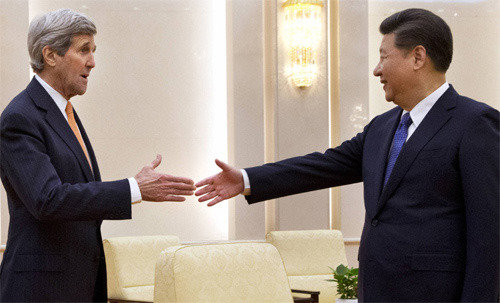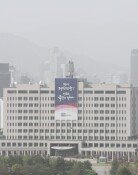U.S., Chinese foreign ministers fail to narrow differences on N. Korea sanctions
U.S., Chinese foreign ministers fail to narrow differences on N. Korea sanctions
Posted January. 28, 2016 07:18,
Updated January. 28, 2016 07:27

At a joint news conference after the talks with Kerry, Wang said that the only option to resolve the North Korean nuclear issue is through dialogue and negotiations.
Kerry vowed that the U.S. would take whatever steps it needed to protect itself and its allies and expressed trust in China's ability toward North Korea, urging Beijing to put pressure on Pyongyang.
But Wang said that nothing should be missed among denuclearizing the Korean Peninsula, resolving the issue through dialogue and negotiations, and ensuring peace and stability on the peninsula. "Our position will not be swayed by events or temporary mood of the moment," he stressed. Regarding the stronger North Korea sanctions led by the U.S., the Chinese foreign minister made it clear that "sanctions are not an end in themselves." The remarks suggest Beijing's objection to stronger North Korea sanctions sought by Washington.
Noting that the North was threatening the world with its nuclear weapons and long-range missiles, Kerry pressured China, saying, "All nations, particularly those who seek a global leadership role, or have a global leadership role, have a responsibility to deal with this threat." He has also offered the North economic, energy and food assistance if Pyongyang opens its doors and makes new choices.
Meanwhile, a U.S. think tank observed that it is highly likely for North Korea to launch cyber attacks on both the private and military sectors in the U.S. and South Korea following the fourth nuclear test. The Washington-based Center for Strategic and International Studies (CSIS) said in a report released Wednesday on North Korea's cyber operations that without any contingency situation, the North would not stop its cyber attacks on Seoul and Washington because they are cheaper and would less likely to result in direct retaliation than other military provocations.
Commenting on the Dong-A Ilbo's Monday report that the North's Reconnaissance General Bureau was responsible for a cyber provocation against the South's Samsung Group, a spokesman for Seoul's Unification Ministry said the North is presumed to be responsible for the attacks, adding Seoul's responses will be determined after further verifications.
베이징=구자룡특파원 bonhong@donga.com · 워싱턴=이승헌 특파원ddr@donga.com







